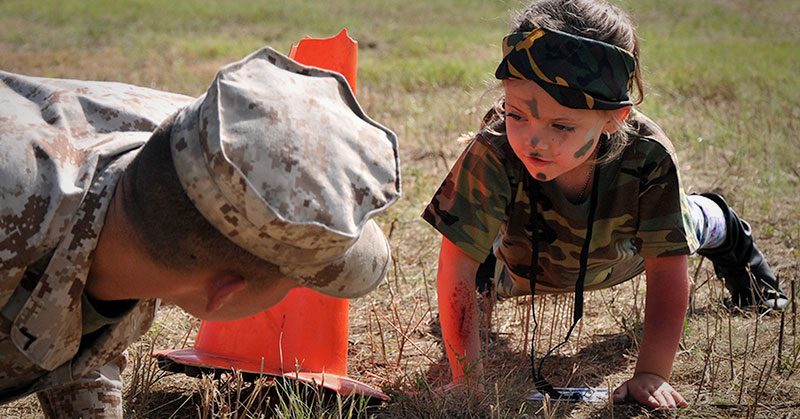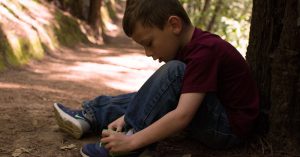I was not raised in a military home. I grew up in the same house my entire childhood, went to school with the same classmates from beginning to end, lived close to relatives, knew everything about my city and could blissfully plan and anticipate things happening more than six months into the future. But then I married a soldier, and all of that changed. I also went and had a couple babies to add to the mix, you know, just to keep things extra crazy.
I realized early on that my children were going to have unique childhood experiences that I would have no idea how to navigate. I looked to the expertise of seasoned military spouses and parents who have raised strong, resilient children and was able to get some excellent insight.
But I have to say, watching my children grow and handle the curveballs MilLife has thrown at them – in their own ways – has provided some amazing pearls of wisdom. It turns out that I am raising some of my favorite teachers. Here are some of the lessons I have picked up from them along the way:
- Always welcome the new kid. This past year, my children were rezoned after one semester into a brand-new school. Because we lived in a district with a large civilian-based population, many of my children’s classmates were concerned about starting over, because this was something many of them had never had to do before. My children were such good supporters for their classmates, because being the new kid is something they are SUPER familiar with! Not only were they able to console peers who were leaving friends behind for the first time, but they were also able to spot and include the kid who was sitting alone in class or on high alert for the students at recess who looked displaced, so they could invite them to play. As a grownup I won’t need to save anyone at recess, but that doesn’t mean I should ever outgrow the childhood trait of helping the new kid. I know what it feels like to be the person dropped into the middle of somewhere completely foreign and left to figure it all out on my own. I know what it feels like to try to infiltrate friend circles that are already well established. Therefore, I can become more sensitive to spotting the person who looks like they are lost and could use a friend.
- You are worth getting to know. I am in awe of the way that my son can just go over to any group of kids and ask to join them in play. Sometimes his request to join in gets shot down, but often he is welcomed—completely oblivious to the fact that he has just done something so beautifully brave. I am not always like my son. I tend to wait until I’m invited instead of boldly asking to join the group, but this kind of bravery does not need to be reserved for our children. I may not receive the reciprocation of interest that I was hoping for every time, but that shouldn’t keep me from reaching out the next time.
- Everywhere is an “adventure assignment.” I have been completely shocked by how my kids are able to embrace the best parts of every single place that we’ve lived — and even more so by how they are able to move to every place with honest excitement. They are looking at the best parts of what their new home has to offer. Each place holds its own charm in my children’s eyes. From them I learned that adventure happens where we make it.
- Use insight from your old home to make your new one better. My kids can take something great that they’ve learned from their old home and use it to help improve their new one. One thing that my children noted was missing in their new school was a “student ambassador” position. My daughter took the initiative to write to her principal and let her know how the future new students of her school might benefit from a friendly peer to show them the ropes on their first day. One of the best things military families bring into our new communities is our vast array of experiences. Each of us has useful ideas and insights to help the existing organizations and programs in our communities grow. Watching my kids take initiative in this way has helped me remember that we can be both learners and leaders everywhere we go.
- Being resilient doesn’t mean you always have to be tough. The military lifestyle is so rewarding, but it can also be very hard. We all applaud our military kids for being resilient—for rolling with the punches and moving forward into the unknown with grace and strength, for living with a sense of duty and patriotism that matches a lot of adults—but that doesn’t mean they have to be on their A-game all the time.
Our family is getting ready to move again, and this one is really hitting my kids hard. Sometimes they randomly cry and feel anxious that they won’t fit in. Sometimes they say, “It’s not fair.” This doesn’t mean that they’re not resilient or strong or capable. It just means that they’re human.
Watching my amazing kids let down their guards like this has reminded me that no one requires me to keep a strong front all of the time either. It is okay for me to vocalize my feelings, to express my disappointment, or confess my worries. Having a moment to recognize those feelings in myself doesn’t make me weak. Pushing on in spite of those feelings and coming out stronger on the other side is how true resilience is fostered.
So, what about you? What lessons have your military kids taught you?




